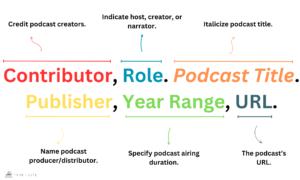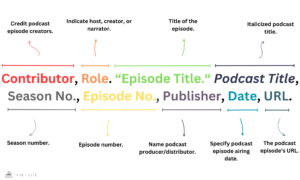How to Cite a Podcast in MLA Format
- Tomas Elliott (Ph.D.)
- Published on 05/03/2024
Podcasts are really important for students because they’re full of useful information and fun stuff. Students use them a lot to learn about different things and hear different opinions. It’s common now for students to use podcasts in their work. But, it’s super important to cite them correctly to keep everything fair and honest.
CITING A PODCAST
When citing a podcast in MLA format, it’s essential to include specific elements to facilitate proper identification and retrieval. Here’s a step-by-step guide:
- Contributor: Identify the individuals responsible for the podcast’s creation or production, listing hosts, creators, or narrators by name.
- Role: Specify the role of the individual cited, typically as a host/creator/narrators.
- Podcast Title: Provide the title of the podcast in italics.
- Publisher: Include the name of the publisher responsible for producing and distributing the podcast.
- Year Range: Specify the publication year of the podcast. If the podcast is ongoing, use a hyphen and space to indicate.
- URL: Conclude the citation with the URL of the podcast’s homepage.
EXAMPLE CITATION FOR A PODCAST
| Citation |
Garcia, Juan, creator. Music Cultures. SoundScapes, 2024– , www.soundscapes.com/podcasts/Music Cultures.
|
| Structure |
Creator Surname, Creator First Name, Role. Podcast Title. Publisher, Year Range, URL.
|
 |
Follow MLA Guidelines: Adhere to the Modern Language Association (MLA) guidelines for formatting citations. Ensure consistency in punctuation, capitalization, and italicization. Use a standardized format for listing elements to maintain clarity and professionalism. Differentiate Between Podcast and Episode Citations: Distinguish between citing an entire podcast and citing a specific episode. For a podcast citation, include details about the overall podcast, while for an episode citation, provide additional information such as the episode title, season number, and episode number. Include Episode Specifics: When citing a specific podcast episode, provide details such as the episode title, season number, and episode number. This additional information helps readers precisely locate the content referenced within the broader podcast series. Verify URLs: Double-check the accuracy of URLs to ensure they direct readers to the correct source. URLs should be accessible and lead directly to the podcast’s homepage or the specific episode cited. |
CITING A PODCAST EPISODE
In addition to citing the overall podcast, MLA format also accommodates citations for specific episodes. Follow these steps for citing a podcast episode:
- Contributor: Identify the people behind the podcast’s creation or production, listing hosts, creators, or narrators by their names.
- Role: Describe the role of the person being cited, usually as a host, creator, or narrator.
- Episode Title: Provide the title of the episode within double quotation marks.
- Podcast Title: Include the title of the podcast in italics.
- Season and Episode Numbers: Specify the season and episode numbers of the podcast if applicable.
- Publisher: Mention the name of the publisher responsible for producing and distributing the episode.
- Publication Date: Include the day, month, and year of the episode’s publication.
- URL: Conclude the citation with the URL of the specific episode if available online.
EXAMPLE CITATION FOR A PODCAST EPISODE
| Citation |
Lowe, Sarah, host. “COVID-19 Vaccination Rollout.” Health Matters Now, episode 42, Public Health Updates, 3 May 2024, publichealthupdates.com/podcasts/health-matters-now/episode-42-covid-19-vaccination-rollout.
|
| Structure |
Host Surname, Host First Name, Role. “Episode Title.” Podcast Title, Episode Number, Publisher, Day Month Year, URL.
|
GIVE YOUR CITATIONS A BOOST TODAY
Start your TypeCite Boost 3 day free trial today. Then just $4.99 per month to save your citations, organize in projects, and much more.
SIGN UP
